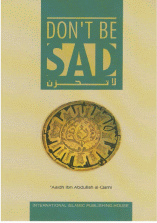Don't be Sad

Asking Allah for forgiveness opens locked doors
Ibn Taymiyah said,
"When I am confused in my understanding of an issue in religion, I forthwith beseech Allah to forgive me one thousand times --- maybe a little more or maybe a little less. Then Allah opens what was closed for me and I come to understand"
(l said [to them]: 'Ask forgiveness from your Lord; Verily He is Oft-Forgiving; he will send rain to you in abundance.) (Quran 71: 10-11)
One way of finding inner peace is to constantly seek forgiveness from Allah. Even a sin can be a blessing if it causes the believer to turn to his Lord in repentance. In Al-Musnad the following is related:
"Allah does not make a decree for his slave except that it is better for him."
In regards to this hadith, Ibn Taymiyah was asked, "Even the sin?" He replied, "Yes, if it is followed by repentance, regret, asking for forgiveness, and a sincere feeling of remorse for having transgressed.
(If they [hypocrites], when they had been unjust to themselves, had come to you [Muhammad] and begged Allah s Forgiveness, and the Messenger had begged forgiveness for them: indeed, they would have found Allah All-Forgiving, Most Merciful) (Quran 4: 64)
(And so are the days [good and not so good], we give to men by turns) (Qur’an 3: 140)
(The day they see it, [it will be] as if they had not tarried [in this world] except an afternoon or a morning.) (Qur’an 79: 46)
I always feel wonder when reflecting on some famous historical figures. Even though they faced hardships, it seems as if to them their hardships were as gentle as drops of water. In the forefront of this elite group is the leader of the creation, Muhammad (bpuh). He was in the cave with Abu Bakr (may Allah be pleased with him), with his enemies near them, and he said to his Companion:
('Be not sad (or afraid), surely Allah is with us.) (Qur'an 9: 40)
"Glad tidings from the unseen at the mouth of the cave:
Revelation that led to happiness for the world."
Just before the battle of Badr, the Prophet (bpuh) eagerly put on his armor while saying:
(Their multitude will be put to flight, and they will show their backs.)
(Qur'an 54: 45)
And in the battle of Uhud, after some of his Companions were martyred and others were injured, the Prophet (bpuh) said to his Companions:
"Line up behind me so that I can praise my Lord."
It was the determination and will power of a Prophet that could even, by the will of Allah, shake mountains.
Qays ibn 'Aasim al-Manqari, famous among the Arabs for his patience, was once narrating a story to some of his companions, when a man came and told Qays, "Your son has been murdered. The son of so-and-so was the culprit." Qays didn't cut his story short, but instead continued relating it in a calm demeanor until he finished.
Then he said, "Wash my son, shroud him, and allow me to pray over him!"
(And those who are patient in extreme poverty and ailment [disease] and at the time of fighting [during the battles].) (Qur'an 2: 177)
lkrimah ibn Abi Jahl (may Allah be pleased with him) was offered water on his deathbed, and he said, "Offer it to so and so."
There were a number of them, all on the verge of dying, and each preferred the person beside him to his own self, and with this wonderful display of brotherhood they all died.
